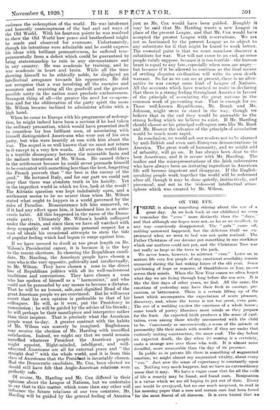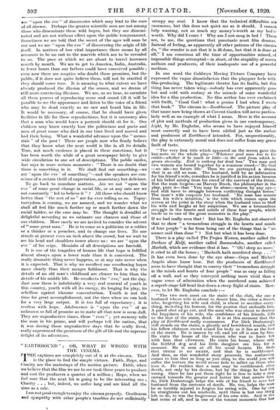ON THE EVE.
THERE is always something stirring about the eve of is great day. As we look back at our childhood we heem to remember the " eves " more distinctly than the "clays," and that although our hopes were not, so far as we recollect, iii any way consciously disappointed. 'The " gala " came otT, nothing untoward happened, but the delicious thrill we ex- perienced when we went to bed was not quite realized. The Father Christmas of our dreams put something in our stockings which our mothers could not put, and the Christmas Tree was not really as large as the trees in the park.
We never learn, however, to mistrust "eves." Later on in mature life very few people of any emotional sensibility remain unmoved during the last waking hours of the old year. Seine quickening of hope or remorse, of thankfulness or fear, proses across their minds. When the New Year comes we often forget what day we are living through long before the sun sets. it is like the first days of other years, we find. All the same, the emotions of yesterday may have their fruit in courage, pre- caution, or betterment. There is a certain lifting up of the heart which accompanies the expectation of acute pleasure, discovery, and, where the terror is not too great, even pain. The eve of a wedding excites the emotions of a whole house ; some touch of poetry illumines most minds as they prepare for the feast. An expected birth produces a like sense of exal- tation, even among those wholly unconnected with the child to be. Consciously or unconsciously, a sense of the miracle of personality Oa their minds with wonder if they are under that curiously uniting construction, the same roof. The day before an expected death, the day when its coming is a certainty, casts a strange awe over those who wait. It is almost more dreadful, more memorable than the day of its presence.
In public as in private life there is something of augmented emotion, we might almost say augmented vitality, about every "eve." Just now the sense of expectancy is constantly upon us. Nothing very much happens, but we have an extraordinary sense that it may. We have a vague sense that for all the evils of life a remedy may be found, and found soon. Resignation is a virtue which we are all hoping to put out of date. Every one would be overjoyed, but no one much surprised, to read in his morning paper that a sure and certain cure had been found for the most feared of all diseases. It is even hinted that we are "upon the eve" of discoveries which may lead to the cure of all disease. Perhaps the greater scientific men are not among those who disseminate these wild hopes, but they are dissemi- natal and are not without effect upon the public temperament. Sometimes we are told that the secret of the ages will soon be out and we are "upon the eve" of discovering the origin of life itself. In matters of less vital importance there seems by all accounts to be no end to the marvels which are to be revealed to us. The pace at which we are about to travel increases month by month. We are to get to America, India, Australia, in fewer hours than our fathers could have conceived possible ; even now there are sceptics who doubt these promises, but the public, if it does not quite believe them, will not be startled if they should come true. It is amazing to what extent we have already produced the illusion of the senses, and we dream of still more convincing illusions. We are, so we hear, to correlate all these powers of reproducing scene and sound till it will be possible to see the appearance and listen to the voice of a friend who may be dead exactly as we saw and heard him in life. It would be necessary, of course, that he should have given facilities in life for these reproductions, but it is necessary also that a man who would leave a portrait should sit for it. Our children may know exactly how the politicians and poets and men of great name who died in our time lived and moved and had their being. What a wonderful advance upon the " memo- rials " of the past ! There are people now who firmly believe that they know what the next world is like in all its details. True, not much credence is placed in these assertions, but it has been worth the while of a great newspaper lately to give wide circulation to one set of descriptions. The public smiles, but says in more serious momenta: "There is no doubt that there is something in it. We shall find out something—we are 'upon the ewe' of something "—and the speakers aro con- scious of a certain thrill of expectation, momentary but delicious. To go back to mundane matters. Are we not "upon the eve of some great change in social life, or at any rate are we not constantly 'led to believe it" ? All those who should know better than the rest of us" are for ever telling us so. Topsy- turvydom is coming, we are assured, and we wonder what we shall all feel like much further up or much further down the social ladder, as the case may be. The thought is dreadful or delightful according as we estimate our chances and those of our children. More rarely we are invited to consider the advent of "some great man." He is to come as a politician or a soldier or a thinker or a preacher, and to change our lives. No one stands at present even an inch above the crowd, but we wait to see his head and shoulders tower above us : we are "upon the eve" of his reign. Messiahs of all descriptions are foretold. It is one of the tragedies of human life that hope is fulfilled almost always upon a lower scale than it is conceived. The really dramatic thing never happens, or at any rate never when it is expected. That is why we recollect our overflowing hopes more clearly than their meagre fulfilment. That is why the details of an old man's childhood are clearer to him than the details of his middle life. He recollects the "eve," not the day. Just now there is indubitably a very real renewal of youth in this country, youth with all its energy, its longing for play, its rebellion against irksome concentration. Youth is not the time for great accomplishment, not the time when we can look for a very large output. It is too full of expectancy ; it is restless with hope. Adolescence is" upon the eve" of an unknown so full of promise as to make all that now is seem dull. They are unproductive times, these " eves " ; yet memory tells the man in his prime, and will perhaps tell the nation, that it was during those unproductive days that he really lived, really experienced the greatness of the gift of life and the supreme delight of its adventure.







































 Previous page
Previous page